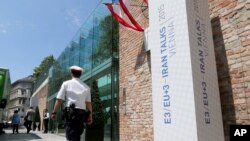When Iran and world powers reached a framework in April for a final comprehensive nuclear agreement, U.S. President Barack Obama hailed the accord as one that would "cut off every pathway that Iran could take to develop a nuclear weapon."
"Iran will face strict limitations on its program, and Iran has also agreed to the most robust and intrusive inspections and transparency regime ever negotiated for any nuclear program in history,” Obama said at the time.
With just days remaining until the deadline for a final agreement, major differences exist between the two sides that have caused some officials to voice concern that the deadline will not be met.
The essence of the deal is to curb Iran's activities for a decade in exchange for lifting sanctions that have crippled the Iranian economy.
No inspection access
Iran, however, has insisted that it will not allow international inspectors access to military sites, to interview scientists or to review documents to verify that it is complying with the nuclear deal.
A few days ago, Iran's constitutional watchdog, the Guardian Council, ratified legislation that bans access to military sites and scientists.
Representatives from the United States, Britain, France, Russia, China and Germany – the so-called P5+1 group that is negotiating with Iran – want inspectors from the United Nations' nuclear watchdog, the International Atomic Energy Agency, to have open access to the sites.
In addition, Iranian officials want the sanctions to be lifted immediately once a deal is finalized, especially those that target Iran's oil and banking sectors. The P5+1 supports a phased-out relief process that links the lifting of most sanctions to the U.N. inspections.
The sanctions would be gradually eased as Iran shows that its atomic program has no military dimensions.
Three conditions
On Saturday, French Foreign Minister Laurent Fabius said three conditions are essential for reaching an agreement that acknowledges "Iran's right to civilian use of nuclear power but guarantees that Iran renounces effectively and definitively nuclear weapons."
Fabius spoke in Vienna, where officials from Iran and the P5+1 are in their final round of talks before the deadline this Tuesday.
"The first (condition) is a durable limitation of Iranian nuclear research and production capacities," Fabius said.
"The second condition is a vigorous verification of sites, including military, if necessary. And the third condition is an automatic return to sanctions in case of violation of the terms agreed to by Iran," he said.
"These three conditions respect the sovereignty of Iran. They are not yet accepted by all parties. And yet they are the basic, indispensable triangle for the robust agreement we seek," Fabius continued.
Sticking point
Another key sticking point in the negotiations is how many centrifuges, the devices used to enrich uranium, that Iran is allowed to keep under a new agreement.
Iran currently has about 18,000 centrifuges, but the P5+1 wants to limit the number Iran can keep installed to some 6,500 for a 10-year period at its two main nuclear sites, Natanz and Fordo.
Iran has long claimed that its goal is to enrich uranium for scientific, medical and energy purposes; but, uranium can also be enriched into material for a nuclear weapon.
The agreement imposes restrictions on Iran's enrichment capabilities so the uranium comes nowhere close to weapons-grade material.













